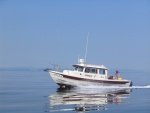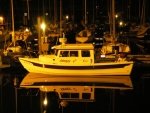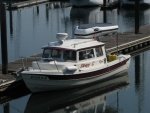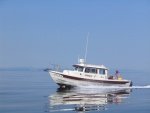So to not go back over everything that has been stated so far, and yet accentuate the advantages of AIS I would add that I have had AIS receive via a Standard Horizon 2150 hooked to both a GPS and my RayMarine C-120 Classic chart plotter for about 3 years now, and I :love it.
Is it necessary, well no, probably not as necessary as trim tabs, but more necessary than a porta pottie :lol: :lol: but Sunbeam is right, if you are not in an area where there will be
any commercial traffic
period maybe its OK to be without. There are getting to be more recreational vessels with AIS B transponders and they do show up plenty often.
The advantages of AIS that has not been mentioned so far are exceedingly important in using it for safety sake.
1. It takes less than 10 seconds to determine collision/crossing status. And this can be done long before (like 5 - 10 miles) anyone's blood pressure needs to spike.
2. It can see through an island, or breakwater, or a big ship, and see a vessel on the other side of that object that your radar can not see through.
And the 3rd, which has been alluded to, is contacting the other vessel. Yes, you can call them by name, and you can give them your position and distance relative to them BUT, you can also, (with the Standard Horizon 2150 or 2200, use the features of that vhf set and do a one button DIRECT call on DSC, without having to look up their MMSI and putting it into your radio.
The display on the chart plotter shows a (on mine) purple triangle, pointing in the direction of the vessels heading. I can run the cursor over onto that triangle, it lights up with an AIS info flag, I push one button to get
(Hey, THIS IS THE IMPORTANT STUFF HERE) a chart table that has:
CPA (= Closest Point of Approach)
TCPA (= Time to Closest Point of Approach)
Both really great things to know if I and that vessel have a crossing or meeting situation pending.
Those to points of interest are the things I check on every vessel where there is any likelihood of either situation., and on some, that is checked several times over a period of minutes.
AIS also reports the vessels name, speed, direction, size (length, beam and draft), destination, and MMSI, along with some other stuff like cargo on board and more I never look at.
If you are on the water, other than small lakes, or rivers, I would highly recommend at least an AIS receiver VHF. There are several companies that make them now. They must be hooked up to a GPS to be functional, and to your chart plotter to be practically useful.
Radar in the fog is good. Radar overlay with AIS is great, because you now have a very quick way of contacting that yellow spot that is coming towards you at 18 knots, and confirming that they see you, and they you both are on the same page in the meeting situation.
Now back to original programming. I believe the question was for a VHF recommendation. Well now, Some of the features have already been listed so I won't go into all that but there is one company that has recently come out with a very practical feature only found on their radio, and they have all that other cool stuff too. Some of that stuff is:
Hailer/fog capability. In my area that is a must. I use the fog horn (auto program) most often; The hailer gets used on coming into a marina as an amplified listening device, in case someone is yelling at me for some screw-up I am doing. Then I know to straighten up my act.
The AIS, I have already addressed. I would not be on the water without it. (Note that there is a difference between an AIS - (which is either an A or B series= transmitting and receiving) and an AIS receiver as an option in a VHF marine radio.
The Plus Feature is the 2 minute recording of the last call. For me, and my memory, this feature is worth the $$. It has a record feature that allows almost instantaneous replay of the last 2 minutes. This radio has become my channel 16 monitoring radio.
If money was no object, I would have 2 of them exactly the same, but since it is, I only have one. If/when the other VHF goes to pot, it will be replaced with
a new ICOM M-506.
Right now, anyone looking towards a VHF purchase should at least look at the ICOM, and this is my belief that any radio that goes into a boat, fishing or cruising is worthy of having the increased safety level of AIS (receive at least) on board.
The 2 minute recording is obviously a matter of preference but again, I think it is a matter of safety for myself and maybe for others.
Harvey
SleepyC :moon





